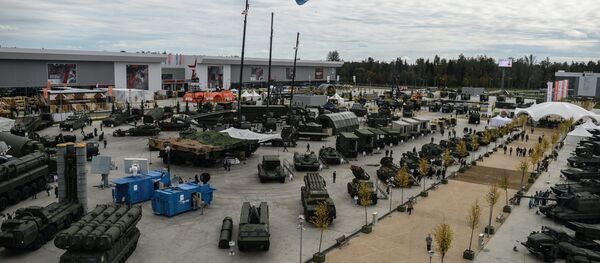US President Donald Trump announced on October 20 that the United States would pull out of the INF Treaty, claiming that Russia violated the agreement. Kremlin spokesman Dmitry Peskov refuted Trump's accusations and warned that Russia would be forced to take measures to ensure its security.
Double Standard
The INF Treaty was signed by then-leader of the Soviet Union Mikhail Gorbachev and then-US President Ronald Reagan in 1987 amid the Cold War. The two sides reached a historic agreement to cut their nuclear arsenals and pledged to destroy all cruise or ground-launched ballistic missiles with ranges between 310 and 3,400 miles.
On Thursday, Russian Foreign Ministry Maria Zakharova said NATO did not provide Moscow with any data on Russia's alleged non-compliance with its obligations under the INF treaty.
"The US maintains that Russia violated the agreement. That being said, the US has violated the agreement directly or indirectly in several ways," Szaszdi said.
Szaszdi recalled that the US violations had included the development of a land-based version of the Aegis Ballistic Missile Defense System known as the Aegis Ashore system.
The Aegis Ashore system deployed in Deveselu, Rumania, the analyst added, could launch Tomahawk cruise missile armed with nuclear weapons, the TLAM-N, which has a maximum range of 1,500 miles.
Szaszdi also said that another Aegis Ashore site is being established in northern Poland and Japan also plans to deploy the systems.
READ MORE: ‘Russia Prepares for War, US Prepares a War’ – Diplomat on INF Treaty Withdrawal
"Thus, Rumania and Poland each could have potentially 24 Tomahawk missiles ready to launch, with a total of 48 cruise missiles threatening European Russia, plus Japan having the potential to deploy up to 48 Tomahawk missiles ready to launch in its planned two sites, threatening the Russian Far East." Szaszdi said.
Arms Race
In an opinion piece published in The New York Times newspaper on Friday, Gorbachev said that the Trump administration has in effect taken the initiative to destroy the entire system of international treaties and accords underlying global security.
Szaszdi warned that Trump's decision to pull out of the treaty was likely to backfire badly on the United States.
"It is a big mistake for the United States to abandon unilaterally the 1987 INF agreement, for in doing so it risks losing an advantage by inviting a nuclear arms race with Russia, China, and probably also with other powers like North Korea," he said.
Other consequences, the analyst said, will include "proliferation of ABM systems and thus an arms race in missile defense systems, which in turn would exacerbate the proliferation and arms race in offensive missiles."
National Security lawyer Bradley Moss cautioned that Trump's decision to destroy the INF Treaty would deal a dangerous blow to the process of reducing and destroying nuclear weapons stockpiles around the world.
READ MORE: Russian FM: Moscow Provides US Info on Missile Tests That Allegedly Violated INF
"The President’s apparent decision to withdraw from the INF is a serious step back in the arms reduction and limitation efforts that have been ongoing since the final days of the Cold War," Moss said. "The current environment reflects a troubling moment in US-Russian relations, as the ongoing probes into Russian collusion in the 2016 election and President Trump’s unconventional style of personal diplomacy collide with the realities of foreign relations."
Russian Foreign Minister Sergei Lavrov said on October 25 that recent talks between Russian President Vladimir Putin and US National Security Adviser John Bolton made it clear to Moscow that Washington had already made up its mind about leaving the treaty and that the withdrawal would be announced in about a month-and-a-half.



